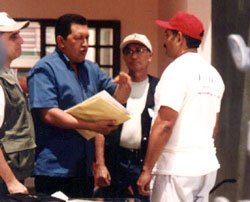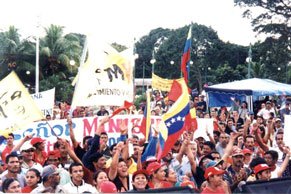


Land Reform in Venezuela
Small Farmers Receive Land, Equipment and Credit
By Alex Contreras Baspineiro
Special to The Narco News Bulletin
September 6, 2003
-Hugo Chávez Frías
President of the Bolivarian Republic of Venezuela
Lara, Venezuela, September 2003: Land in Venezuela – as in most of this continent – has been in the hands of big landowners, politicians, and mercenaries, for years. Today, through the revolutionary Agrarian Reform process, this land is being handed over to peasant-farmers, or campesinos. The land, which had become a commodity rather than a common good, and which served to illicitly enrich the powerful, will begin to be used for communitarian activities and rural development.
 President Hugo Chávez hands land deeds over to peasant-famers. D.R. 2003 Alex Contreras |
On August 31, President Hugo Chávez handed over land deeds to campesino representatives from the states of Barinas, Carabobo, Cojedes, Lara, Portuguesa, and Yaracuy at the Cuara Farm School in Jiménez de Quibor, Lara. The farmers were also given plows and tractors, as well as new credits for farming.
The small farmers, who have spent years fighting for land ownership, celebrated the revolutionary conquest. A huge number of Venezuelan children, women and men, carrying flags, placards, and copies of the Venezuelan constitution, converged at this historic event. Later, Chávez broadcast his famous “Aló Presidente” television and radio show from the festivities.
The peasant-farmers who had fought for years to recover their land made the land transfer into an act of justice, said Braulio Álvarez, a representative from the Ezequiel Zamora National Agrarian Board.
Plan Zamora
The Venezuelan National Land Institute (INTI in its Spanish initials) is carrying out the land distribution under the co-called “Plan Zamora.” The plan – as well as Álvarez’s organization – is named in memory of Ezequiel Zamora, the 19th century Venezuelan peasant leader who struggled for land reform, social equality, and human rights for the poor.
In the first phase of Plan Zamora, more than a million hectares (2.5 million acres) were transferred to campesinos, benefiting more than 40,000 families. The government handed over 31,437 land deeds, 121 farm machines and 30 billion bolívars (US$20 million). The second phase of the plan will be to distribute two million hectares by the end of this year.
The Eziquiel Zamora National Agrarian Board brings together 22 campesino, indigenous and small business organizations in a horizontal organizing structure.
International representatives participated – together with the people Venezuela – in the main event of the land transfer. Among them were, from Honduras, Rafael Alegría of the Vía Campesina (“Farmers’ Path”) organization and Juan Tiney of the Latin American Peasant-Farmer Organizing Board; from Ecuador, Blanca Chancoso of the Confederation of Indigenous Nationalities; and from Brazil, Elgidio Brunetto of the Landless Workers’ Movement. They were all there to bear witness to the Agrarian Reform, part of the proceso, or change process, going on in their neighboring country of Venezuela.
Along with this change in agrarian policy, other processes going on in Venezuela must be emphasized here. The literacy project known as the Robinson Mission hopes to teach 1.5 million Venezuelans to read and write. The Barrio Adentro (“in the slums”) program provides free health care to more than 200,000 people. Basic, secondary and university education, as well as many other public programs, have improved.
A Difficult Process
 Campesinos celebrate the Agrarian Reform in Comunare Rojo D.R. 2003 Alex Contreras |
INTI director Leonel Ricaurte said that land distribution affects the powerful groups that governed Venezuela many years ago. The ITNI is known for its hard work, strength and transparency.
There is a festive atmosphere in many farming communities here due to the land transfers. A day before the big event, hundreds of campesinos met in Comunare Rojo (in the state of Yaracuy) to express their support for the revolutionary process. With music, poetry, and songs – but also with a profound commitment – they demonstrated that they would defend their lands, even if it meant giving their lives.
International Solidarity
Speaking for the peasant and indigenous leaders who had come from other countries, Rafael Alegría from Vía Campesina expressed his solidarity with the Venezuelan people. In a document handed to President Chávez, all the organizations endorsed the agrarian reform process and Venezuela’s goal of food sovereignty. They also condemned the repression from “insubordinate sectors” that hope to use mercenary killers to maintain their privilege with threats and assassinations.
The document states:
“Vía Campesina expresses its firm support for the Venezuealn people and the Bolivarian process, and announces that the coming months we will be organizing – together with other organizations committed to social justice and the search for concrete alternatives to neoliberalism – an international conference of solidarity with the agrarian reform process.”
Despite the threats, under the premise of “globalizing struggle and hope,” Venezuela’s small farmers are moving ahead with a genuine rural development program after years of injustice. As the campesino and indigenous leaders from around our América say, “la tierra es vida” – “land is life.”
Lea Ud. el Artículo en Español
- The Fund for Authentic Journalism
For more Narco News, click here.




